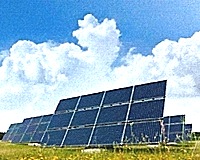- By Dan Veaner
- News
 Print
Print  The Lansing Town Board considered opting out of a state law that would give tax exemptions to solar installations Monday. Opting out will increase tax revenue from large commercial power-producing solar installations for the municipality. But Tompkins County Director of Assessment Jay Franklin says it won't hurt homeowners and small businesses in the town who put solar panels on their roofs.
The Lansing Town Board considered opting out of a state law that would give tax exemptions to solar installations Monday. Opting out will increase tax revenue from large commercial power-producing solar installations for the municipality. But Tompkins County Director of Assessment Jay Franklin says it won't hurt homeowners and small businesses in the town who put solar panels on their roofs."You would opt out in order to grab the value of these power producing entities," Franklin says. "It adds value to big projects. It's not hurting the private person or small business that puts solar panels on their roof because it doesn't increase their assessment."
The law opts taxing authorities into the exemption by default. That means that any solar, wind, or farm waste power producing properties do not pay property taxes on the parts of their properties that have such installations. If a community wants tax revenue from a solar installation that adds value to a property it must opt out. That could mean new revenue for the Town, School District and Fire District.
Three significant solar installations are proposed in the Town of Lansing. A 2 megawatt solar array on two acres is part of the plan if the Cayuga Power Plant is repowered. Cargill Deicing Technology is reportedly planning a 2.6 megawatt solar project to help provide power for its salt mine. And a ten acre solar array near the Tompkins-Ithaca Airport will help provide power for Cornell University. If all three are realized the first two will certainly provide new revenue to taxing authorities that have opted out. But the largest project does not seem likely to contribute.
"It's on Cornell land," Lansing Supervisor Kathy Miller said. "The actual facility is owned by this other group that will then sell that electricity to Cornell. So they're making a profit selling to Cornell. Are they taxable?"
The proposed Cornell solar farm project calls for Distributed Sun to install 6,766 solar panels that will produce 2.5 million kilowatt-hours per year on 10-acres of Cornell land on Snyder Road in the Town of Lansing. Ten of those panels will be for academic use, but the main purpose of the solar array will be to produce what will amount to 1% of the University's annual power needs. A few years ago Cornell built a natural gas-fired 30 megawatt heat and power system that helps service about 250 buildings campus buildings. Even when the solar project comes on line Cornell will buy outside energy to meet campus power needs.
 Artist John Carberry's rendering of the Cornell/Distributed Sun solar array
Artist John Carberry's rendering of the Cornell/Distributed Sun solar arrayFranklin says Cornell's legal staff is assuming the project will be tax exempt because it is servicing the Cornell community. He cited two examples of private businesses that were declared exempt: Only Cornell faculty and staff are eligible to place their children at privately owned Cornell Day Care, and a Subway sandwich shop in the Ithaca College towers was exempt, despite the fact that the privately owned business was the highest grossing Subway in the Northeast. These businesses qualified for the exemption because they only served College customers.
Franklin said Tompkins County is considering changes to the law that would distinguish between that power producing entity and smaller home or small business uses. But for now opting in or out of the exemption is all or nothing. But he says that the market is not showing that solar panels add resale value to homes in Tompkins County. That allows municipalities to opt out of allowing the exemption without impacting private homes and small businesses that they want to encourage to use renewable energy. Only money-making installations will see a tax impact, at least for now.
"When you put solar panels on your house is someone going to pay you X amount of dollars more because you put it on there?" he asks. "From what we've seen in the marketplace, no. At some point int he future, the way things are moving, it has to be a positive, the way energy prices are. But we're not there yet. At least the marketplace isn't showing that yet."
 Artist's rendering of proposed Cayuga Power Plant solar arrayNew York Real Property Law Section 487 specifies that the exemption only applies to value added by a solar array, wind turbines, or farm waste energy systems. For example, if a new solar array adds $20,000 of market value to your $200,000 house, you would only pay County, Town and School taxes on $200,000, assuming all three taxing authorities opted out before construction began. Fire Departments are not subject to the exemption, which means your property tax would be based on the full $220,000 value of the property.
Artist's rendering of proposed Cayuga Power Plant solar arrayNew York Real Property Law Section 487 specifies that the exemption only applies to value added by a solar array, wind turbines, or farm waste energy systems. For example, if a new solar array adds $20,000 of market value to your $200,000 house, you would only pay County, Town and School taxes on $200,000, assuming all three taxing authorities opted out before construction began. Fire Departments are not subject to the exemption, which means your property tax would be based on the full $220,000 value of the property.The Town of Enfield opted out in 2010, the Ithaca City School District in April of 2012 and Tompkins County opted out that May to benefit from tax revenue coming from the $35 million, 12.6 megawatt Black Oak wind farm in Enfield, which is expected to begin construction on seven turbines some time this year. Franklin says the project is likely to apply for a tax abatement through a Payment In Lieu Of Taxes (PILOT) agreement, that would step up to the full taxable value over a number of years, only possible if the municipalities are taxing the project. He said that other towns are not opting out because large-scale projects are not currently planned within their borders, but it would make sense for Lansing to opt out until its large projects begin construction.
"The best scenario is probably that revolving door," Franklin says. "You opt out. The power-producing place starts construction. And then you opt back in."
That locks in a power-producing project in perpetuity. If the Town opts back in and you then add a new solar installation on your house that increases its market value by $20,000, that amount is exempted for the next 15 years.
Lansing taxing authorities have time to decide whether or not to opt out. Only projects that start construction after opting out are subject to the additional tax, and none of the three big projects will be ready to start right away. But Town officials were anxious to get a decision made soon.
"We can do this at our next meeting," Miller said. "We really need to do it before they start construction."
A public hearing will be scheduled for September 18th with the idea of the board potentially passing a local law to opt out at next month's working meeting.
v9i33



